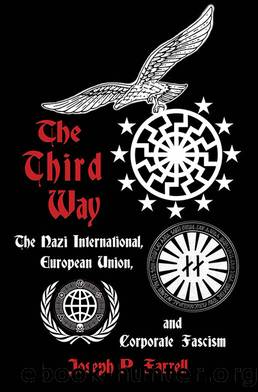The Third Way by Joseph P. Farrell

Author:Joseph P. Farrell [Farrell, Joseph P.]
Language: eng
Format: epub
ISBN: 9781939149480
Publisher: Adventures Unlimited Press
Published: 2015-07-30T04:00:00+00:00
Chancellor Helmut Kohl (1982-1998) At a Christian Democratic Union Party meeting in the early 1980s.
Chancellorin Angela Merkel
1Adam Lebor, Tower of Basel: The Shadowy World of the Secret Bank that Runs the World (New York: Public Affairs, 2013), p. 220.
2Bernard Connolly, The Rotten Heart of Europe: The Dirty War for Europeâs Money (London: Faber and Faber: 1995), p. 10, emphasis in the original.
3Hjalmar Schacht, Confessions of the Old Wizard: The Autobiography of Hjalmar Horace Greeley Schacht (Cambridge, Massachusetts: Houghton Mifflin Company, 1956), p. 85.
4Ibid., p. 1.
5âPeter Oldfield,â The Alchemy Murder (New York: Ives Washburn, Publisher, 1929), pp. 179-183, emphases added.
6For many people this idea is often articulated in conjunction with another, namely, that the âpower elitesâ are under some sort of rule or âmoral lawâ that they must disclose their intentions, howsoever covertly, before proceeding with them.
7Adam Lebor, The Tower of Basel, p. 52. Lebor does not indicate who Jacobssen âco-wroteâ the two thrillers with, but in all likelihood this was probably simply a âghost writerâ who merely put Jacobssenâs observations into readable fiction. Equally possible, however, is that Jacobssenâs ghost writer was also a censor from the corporate, banking, or political world, ensuring that no significant or damning detail slipped into his text.
8Adam Lebor, The Tower of Basel, p. 52.
9Nor are the structures of the European Union a âstate-nation,â a term which will be encountered much later in this chapter when considering the ways in which France interpreted pre-EU monetary structures in general and the European exchange rate mechanism (EMR) in particular.
10Hjalmar Schacht notes one effect of German law on the resulting hyper-inflation: âAgriculture had so far derived considerable benefit from the inflation in so far as the latter had enabled farmers to repay their debts with the debased currency, because the German law supports the principle that mark equals mark. This meant that debts which had been incurred in gold marks could be paid by means of equal nominal amounts in debased paper marks. In addition, the agricultural community used their paper marks to purchase as quickly as possible all kinds of useful machinery and furnitureâand many useless things as well.â (Hjalmar Schacht, Confessions of the Old Wizard, p. 163, emphasis added)
11Hjlamar Schacht, Confessions of the Old Wizard, p. 169.
12Ibid., p. 163.
13Ibid.
14Hjalmar Schacht, Confessions of the Old Wizard, p. 164.
15Ibid.
16Though in this case not being used, at least overtly, to back currency.
17See my Covert Wars and Breakaway Civilizations, pp. 36-43.
18Hjalmar Schacht, Confessions of the Old Wizard, p. 181, emphasis added.
19Hjalmar Schacht, Confessions of the Old Wizard, p. 182.
20There may be a possible connection here to the later Nazi counterfeiting of pound sterling notes during the SSâs Operation Bernhard, though as of this writing, I have found no direct evidence of such a connection.
21Schacht, op. cit., pp. 182-183.
22Hjalmar Schacht, Confessions of the Old Wizard, p. 184.
23Ibid., pp. 186-187. Indeed, Norman not only endorsed it, but lined up enough backing in Britain that Schacht could count not on just 200,000,000 Reichsmarks but half a billion as working capital. (q.v. p. 186)
24Ibid., p.
Download
This site does not store any files on its server. We only index and link to content provided by other sites. Please contact the content providers to delete copyright contents if any and email us, we'll remove relevant links or contents immediately.
| Belgium | France |
| Germany | Great Britain |
| Greenland | Italy |
| Netherlands | Romania |
| Scandinavia |
Room 212 by Kate Stewart(5091)
The Crown by Robert Lacey(4791)
Endurance: Shackleton's Incredible Voyage by Alfred Lansing(4743)
The Iron Duke by The Iron Duke(4337)
The Rape of Nanking by Iris Chang(4189)
Joan of Arc by Mary Gordon(4080)
Killing England by Bill O'Reilly(3987)
Say Nothing by Patrick Radden Keefe(3965)
I'll Give You the Sun by Jandy Nelson(3418)
Shadow of Night by Deborah Harkness(3343)
Hitler's Monsters by Eric Kurlander(3320)
Mary, Queen of Scots, and the Murder of Lord Darnley by Alison Weir(3189)
Blood and Sand by Alex Von Tunzelmann(3181)
Eleanor & Park by Rainbow Rowell(3142)
Darkest Hour by Anthony McCarten(3112)
Margaret Thatcher: The Autobiography by Thatcher Margaret(3068)
Book of Life by Deborah Harkness(2913)
Red Famine: Stalin's War on Ukraine by Anne Applebaum(2910)
The One Memory of Flora Banks by Emily Barr(2848)
